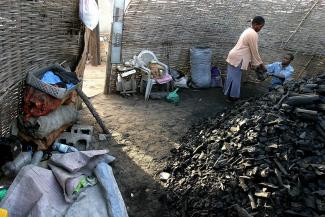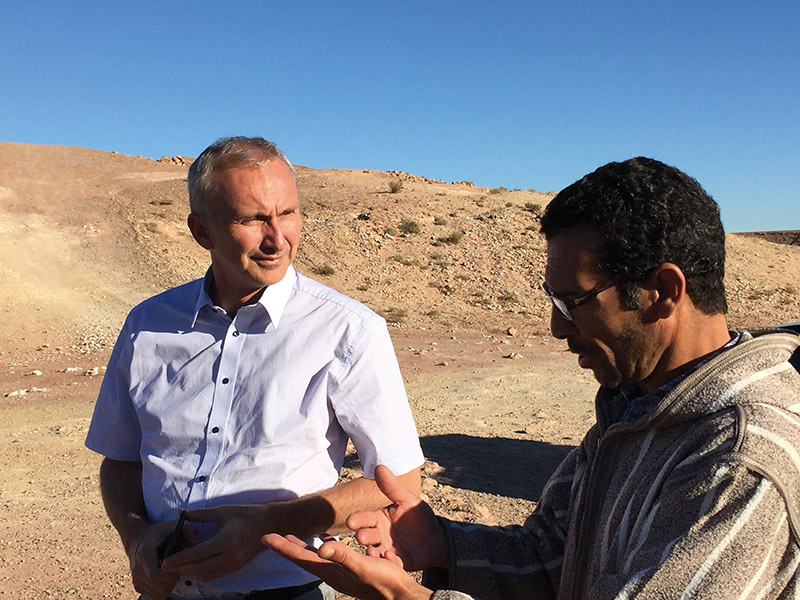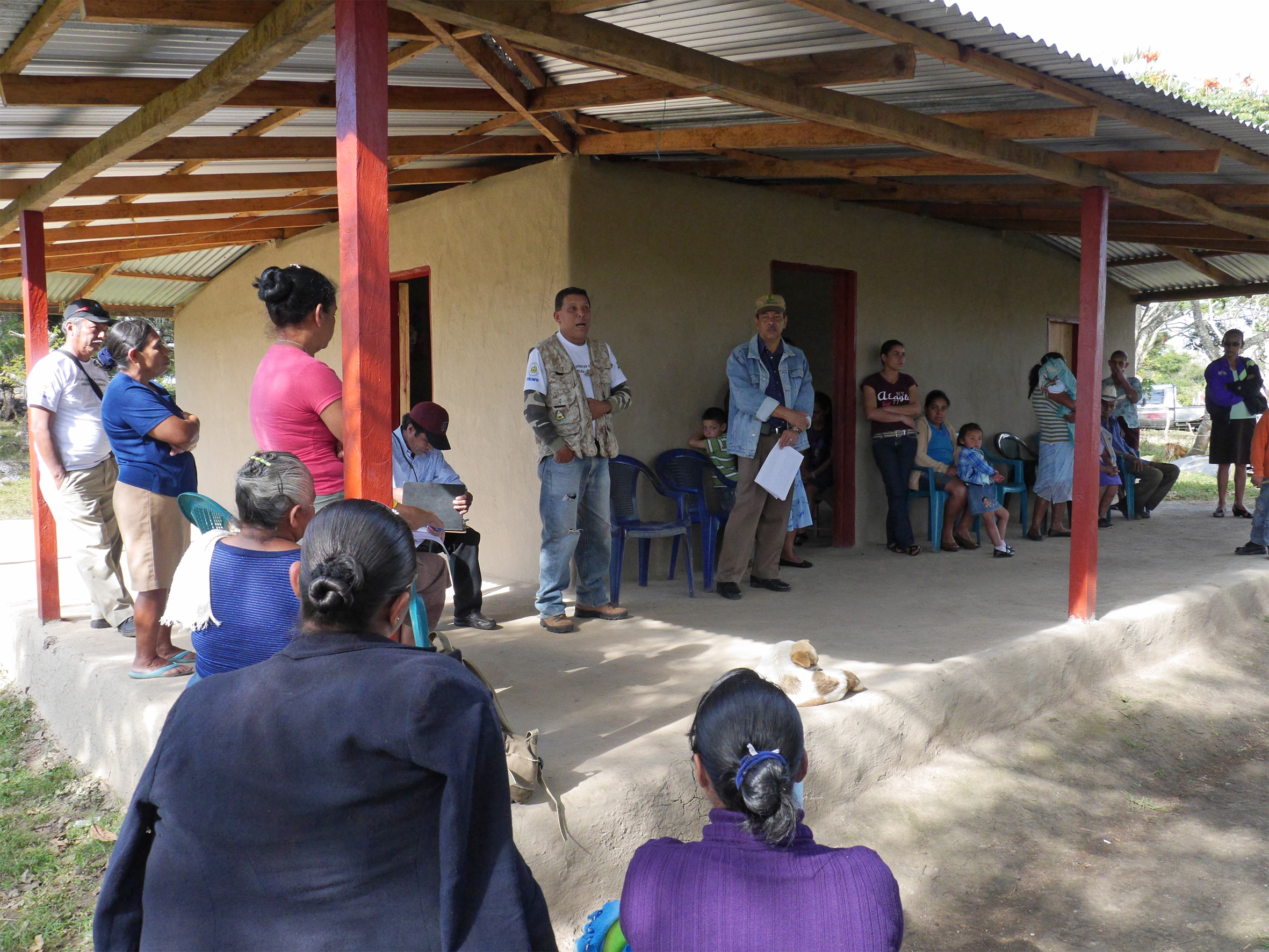Senegal
More water, wind and solar power

Senegal has suffered an inadequate electricity supply for years. Electricity tends to be of very poor quality: voltage and frequency fluctuate, which can destroy devices and machines that are connected to the grid. Indeed, the service life of electrical devices is almost always below the international average.
These problems present real obstacles to economic growth in general and attracting international investors in particular. Private-sector companiesand other organisations frequently establish back-up systems and even generate their own power. The sugar producer CSS and the peanut processor SONACOS have both taken that approach.
Electricity from renewable resources like sunlight, wind and water could power much of the country. Senegal has huge potential in this area. It is one of the best places in Africa to generate solar power, for instance, and certainly belongs to the top third. In regional cross-border cooperation, wind power could be sourced from the coastal regions and hydro power from the Gambia and Senegal Rivers.
Because of the promising conditions, Germany has been supporting the expansion of the renewable-energy sector in Senegal for over two decades. In the past five years, this was a special focus of German development policy. On the one hand, German experts are helping the Senegalese provide power to rural areas, in particular by further decentralising electrification and establishing mini-grids in villages. On the other hand, German experts are advising the Senegalese government on how to create better conditions for the use of renewable energies.
Unresolved issues
As a result of such efforts, Senegal has now laid the foundation for improving the exploitation of its renewable energy resources. In 2010, the government passed a law to bolster this sector. In subsequent years, it followed up with a series of decrees specifying how the law should be implemented. Senegal also established a national agency for the sector. Its task is to carry out relevant public and private projects and to raise money for developing the renewable-energy sector.
The Senegalese government wants to meet 20 % of the country’s electricity demand with renewable energies by 2020. Unfortunately, it has not really come closer to achieving that goal. None of the planned initiatives have been implemented to date.
There are several reasons for such inaction. For starters, the state has not provided any incentives to invest in new facilities. Moreover, there is not even a legal mechanism for feeding electricity generated from renewable resources into the grid of SENELEC, the national electric company. The cabinet, however, is expected to pass a decree to address this matter soon.
The government also needs to define the feed-in tariffs for electricity from renewable resources. The EU Energy Initiative is currently drafting model arrangements, as well as examples of contracts that could be concluded between electricity producers and power-supply companies. Senegal could benefit from this initiative.
Many companies have expressed interest in investing in power-generation capacities, and 70 of them have been approved by a national committee. There was no public tender however, so critics accuse the government of a lack of transparency.
Louis Seck is trying to promote the use of renewable resources in his country. He was Senegal’s minister for renewable energy until 2012 and is now the West African coordinator of the "Climate Parliament" initiative. This internationally active group wants to convince members of the Senegalese and other African parliaments to remove obstacles to progress in the energy sector.
According to Seck, Senegal’s President Macky Sall is not doing enough to improve the situation. Secou Sarr, the director of the non-governmental organisation ENDA Energie agrees. He believes that civil society must lobby for changes to the country’s energy policy. In his opinion, Climate Parliament offers an interesting starting point.
Sarr argues that the lack of dynamism in the energy sector is rooted in the government’s short-sighted energy policy and its narrow approach to solving problems. According to Sarr, Senegal’s government is not currently interested in addressing climate change, even though it signed the United Nations Framework Convention on Climate Change. This lack of long-term vision also means that the government is not considering cross-financing renewable energy production with funds from international climate finance, Sarr and Seck agree.
Coal-fired power plants offer a partial solution. Senegal still relies primarily on petroleum to generate electricity. Accordingly, it depends on the price of crude oil which has risen tenfold in recent years. However, this increase has not been reflected in higher electricity prices for consumers. Though consumer prices have risen, that rise was not enough to cover the costs. Thanks to subsidies, consumers only pay the equivalent of € 0.18 per kilowatt hour on average. That price is about one third low below SENELEC’s production costs.
SENELEC must bare other costs as well. In Senegal, power distribution costs almost € 0.10 per kilowatt hour, almost twice what it costs in Germany. The state uses subsidies to close the gap between what SENELEC spends and what the company gets from its clients. This policy costs the government millions of euros a year. In 2011, for instance, it paid out approximately 150 billion CFA francs (approximately € 228 million) in subsidies, which corresponded to about two percent of Senegal’s gross domestic product, according to the International Monetary Fund.
This situation has disastrous implications in terms of the country’s oil dependence and SENELEC’s viability. The company is deeply in debt and depends on the government for its survival. SENELEC is unable to make urgently-needed investments in power generation, expand its infrastructure or refurbish its ageing power plants.
In order to reduce Senegal’s dependency on petroleum, a coal-fired power plant will soon be built in Sendou. A contract has already been signed with KEPCO, South Korea’s national electric company. The modern power plant, which is being financed by the African Development Bank, will be connected to the grid by 2017. It will be located approximately 35 kilometres southeast of the capital, Dakar, on the Atlantic coast.
Even though the country does not have its own coal deposits and must import coal from South Africa, experts agree that the electricity generated in the Sendou plant will have a stabilising effect on the national power supply and help consolidate the energy sector. However, it will not be a climate-friendly facility.
Striving to meet energy goals
Though Senegal has done very little to expand its use of renewable energies, two promising projects are currently in the planning stages: a wind park with a production capacity of 130 megawatts and a solar power station with a production capacity of 140 megawatts. The latter is being financed by a private investor.
SENELEC will probably have to pay € 0.10 per kilowatt hour for the electricity generated by the solar power station. To import this electricity into the grid will thus be considerably cheaper than generating power on its own. Both the wind park and the solar power station should be connected to the grid by the end of 2016.
If Senegal wants to meet its energy goals, the government must create a reliable environment for private electricity producers to operate in. Feed-in tariffs are a basic requirement. The legislature also needs to pass a law to allow investors to import power-plant components for renewable-energy infrastructure at reduced duty rates. Furthermore, the procedures to authorise electricity production must be reliably regulated. Clear and transparent bidding procedures for private investors are just as important.
It is a major challenge that Senegal has little experience when it comes to dealing with renewable energies. The grid-management system that is currently in place, for example, is not designed for feeding in electricity from decentralised power-generation facilities. Since no one has the necessary expertise, SENELEC faces a great deal of uncertainty.
Other challenges include the poor condition of the grid and the general lack of power-line capacity. Both are likely to prove obstacles to massively expanding the production of electricity from renewable energies. However, experts believe that it can be done nonetheless. In order to solve practical problems and reduce uncertainty, the German Agency for International Cooperation (GIZ) is cooperating closely with the Ministry of Energy in Dakar.
In addition, donor agencies and private-sector companies should lobby at the highest political levels in order to promote favourable long-term conditions for investing in renewable energies. Civil-society organisations should similarly raise their voices, encouraging politicians and the people in general to pay more attention to renewable power generation. Moreover, the government should involve all kinds of interest groups in decision making. Finally, donor agencies must all pull together. The African Development Bank is currently working to improve donor coordination. Its efforts could also help mobilise funding for the production of renewable energies.
Annette von Lossau works as a senior expert for the German Agency for International Cooperation (GIZ) in Senegal.
annette.lossau-von@giz.de
Mansour Dahouenon coordinates the GIZ project „Promoting Climate-friendly Electricity Cooperation in West Africa.
mansour.dahouenon@giz.de









